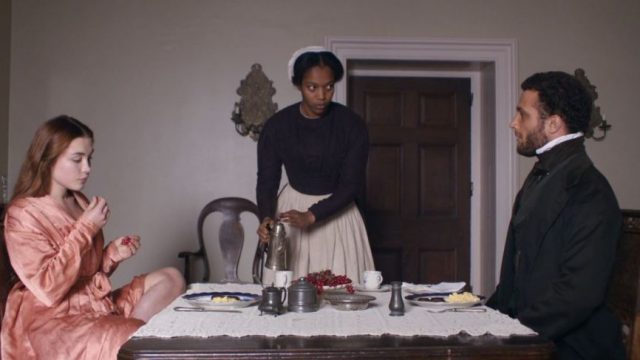Lady Macbeth is nineteenth-century noir rather than tragedy—in-and-out at ninety minutes and with a well-evoked chilly emptiness at its heart. It’s possible in this world to survive, to be victorious; less possible to be happy.
Katherine is a young woman—barely more than a girl—who is married to an older man. Their marriage walls her up alive in his isolated manor: when she’s finally able to step foot outside, the scene has all the tension and unsteady joy of a jailbreak. Her husband loathes her in a chilly, unspecified way; he sees her not as a person but more as an animal who can be well- or badly-trained. He has no interest in her. His father is actively and more attentively cruel. And this is the limit of Katherine’s society except for the servants, and so it is, eventually, the servants to whom she turns.
But this is a world of hunger and satisfaction, not of love, and Katherine’s eventual affair is entirely about whether or not it fills the ravenous loneliness and long-neglected eroticism in her; she treats her lover, Sebastian, as a beloved pet. She loves him, or she tells him so, in the course of demanding his reciprocity. She cossets him. She gives some thought to his happiness but none at all to his conscience or his wants.
It’s a film that deals with privilege, appropriately enough, as a question of violence. Who can safely hurt whom? When is vulnerability an asset? (The same qualities that set Katherine up to be the victim of her husband and father-in-law are ammunition, later on, to rescue her from true accusations: how could someone like her have done such things?) Its delicately-handled interest in these questions and its willingness to establish each character as more fraught, more complicated, and more self-driven than the people around them would like make it a great psychological suspense film. A long, step-by-step progression to one woman alone in a house.
And on top of that, it’s sumptuous in its visuals, full of rich, dark colors and attention to detail—the different way light looks inside a house, no matter how airy and open; the insolence of a particular pose or a particular dress. It all gives the sense of perfectly planned exteriors in which savage interior qualities have been allowed to run amuck.

